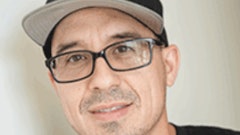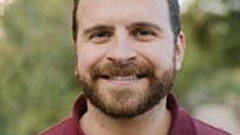
Even in a room filled with spine specialists and neurosurgeons, Priscilla Vilchis never feels out of place.
In her 20s, Vilchis managed some of Southern California’s top physicians, helping them navigate regulations and negotiate with insurance companies as a medical practice consultant. She credits that experience for providing her the self-assurance and the know-how to participate in the cannabis industry.
“I looked at myself like an equal, if not better, every time I sat at the table,” Vilchis says. “Everything I said I would do, I executed... [It’s] imperative that everyone delivers with everything that they say. I think that’s a huge part of gaining respect.”
Now 31, Vilchis is the owner and CEO of Premium Produce, a medical and recreational cultivation and processing company with operations in Las Vegas, Nev., and Lynwood, Calif., and additional delivery and distribution licenses in California.
Her seemingly rapid rise to industry notability (she was the first licensed female minority in L.A. County as well as the youngest female minority to be licensed in Nevada) has earned her the monikers “Priscilla Queen of the Desert” in Nevada and “The Hollyweed Queen” in California. Asked how each of those nicknames captures her character, Vilchis has her answer ready. “Well, that’s simple,” she says. “I’m a queen.”
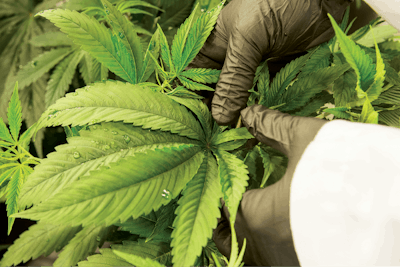
Convincing the Skeptics
Vilchis exudes a regal confidence. She speaks in a soft, but assertive tone, her voice passionate yet composed. She clearly expresses her objectives and details exactly how she is going to complete them. It’s no wonder that one of her greatest strengths is lobbying for herself.
She is skilled at persuading county boards and city councils to trust her with cannabis business licenses, so much so that they have, in turn, asked for her help in convincing skeptical community members. Vilchis comes in to talk to them knowing that by the end of her time, she will have convinced those community members to believe in cannabis, and in her.
She’s especially effective in majority minority-communities, like Lynwood. She has a special connection to these communities because her mother raised her the same way many of the parents she addresses raise their children, she says: by telling them that if they try marijuana, even once, they would die.
“That’s how brutal she was, and I was in my early teens,” Vilchis recalls with a chuckle.
Vilchis says most children from minority communities, especially Latino communities, are raised with that fatalistic mentality on marijuana. Many of those parents and community members don’t know about the plant’s medical benefits. “A lot of them don’t understand that CBD is being given to kids with epilepsy, and it’s helping them operate on a day-to-day basis,” she says.
And Vilchis’ persuasiveness is also what convinced Premium Produce’s lead cultivation consultant, Nathan Race, that joining Vilchis’ project was the right decision. “She is a fierce woman, and she knows how to get things done,” he says.
Race, a British Columbia native with more than 15 years of experience in the medical cannabis space, has known Vilchis for many years, thanks to mutual friends—Vilchis even attended Race’s engagement. When they reconnected years later, Vilchis shared her plan with him.
“She let me know what her aspirations were in the industry, and I let her know that I would be very happy to lend her my expertise,” he says. Race does not regret the offer.
“Working for her has been an everlasting experience of how to operate. I have sat and watched other people in other industries and also in the cannabis industry, both in the United States and Canada, and she has a particular gusto to get things done.”
That gusto was absolutely vital because Vilchis’ project almost never became reality. Had it not been for a phone call and quick decision made when she was in Italy, the Queen of the Desert may never have been crowned.

Cutting It Close
Vilchis filed her application for her Las Vegas cultivation and production center well before the May 31, 2017, deadline: She began the process in 2014, a few months after the state rolled out regulations covering the sale and distribution of medical marijuana.
Over the next three years, she made all the right moves, including making arrangements with the bank to close on what she calls the “perfect” property, and instructing her team on how to handle the next steps of the process. Thinking everything was under control, she headed to Italy for a well-deserved vacation in the middle of May 2017.
That’s when the wheels fell off.
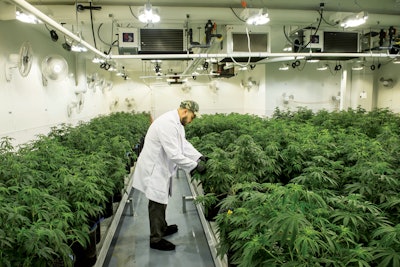
Her lawyer called in the middle of the night, waking her from sleep. “We have an oversight,” he said.
“What do you mean?” she asked.
“I mean, there are no banks that are going to finance a marijuana company. You’re going to have to buy the building and close escrow in 15 days to qualify for this license that you’re applying for,” he replied.
With both time and distance against her, Vilchis was left with only one option: to buy the building herself. Cash. “I call that the $2 million day,” she says with a laugh.
As frustrating and stressful as that situation was, Vilchis views it as a crash course on the complexities of the marijuana business. “This goes to show how new our industry is. It was something that I think no one really could have prepared for.”
It was also a lesson in one of the basic principles of real estate: Buying is almost always better than leasing.
“Our intention was to try and get [the property] leased. I’m now happy that I didn’t do that. … The property value now went up to, I believe, $5.56 million.”
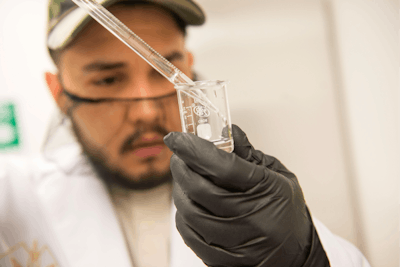
Building for the Future
In addition to her $2 million Las Vegas property investment, Premium Produce put forth an $8 million investment for the Nevada facility. And what does $8 million get you in Nevada? “A state-of-the-art facility,” Vilchis says.
Premium Produce’s facilities feature a custom-made Link4 environmental control system. The system for the Las Vegas facility, which is more than twice the square footage of the Lynwood site, cost the company more than $1 million to purchase and install.
“Each panel has been tailored for the size and the square footage [of canopy] of each room and what we intend to do in it,” Race explains. In addition to standard controls, such as temperature and humidity, the system utilizes automated louvers to control airflow; monitors the irrigation system to warn staff when parts per million (ppm) levels are too high and when filters need to be changed; and plugs into light sensors, alerting the team when a light bulb needs to be changed before grow room light levels become uneven.
The company’s lighting is set on a variable ballast system. This allows Race to ramp up the lights slowly to avoid creating large electricity spikes. He can also lower light levels during the vegetation period, again saving on operating costs. The hybrid high-pressure sodium (HPS) and metal halide (MH) lamps (manufactured by the Canada-based P.L. Light Systems) are set at 1,000 watts during flowering. As Race explains, “We dial our ballast down to 600 watts during vegetation periods to save energy. … We’ve done tests where we’ve put it at 1,000 watts the whole time, and there was really no benefit in growth.”
A point of pride for Race is the company’s CO2 system. Race has consulted on several large-scale grows throughout North America and has seen less-than-ideal CO2 system setups, including some where high-pressure CO2 bottles were simply tied to racks in high-traffic hallways.
“We have one of the most failsafe CO2 delivery systems known to man,” he says. “It’s all electronically controlled. It monitors the amount of CO2 that is being provided to the plants and adjusts accordingly.” As for safety features, “We’ve got an actual air gas cylinder that’s monitored remotely for pressure and how much it contains.”
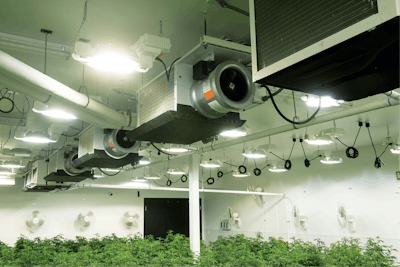
Race says Vilchis differed from most other CEOs he’s worked with in that she worked closely with him to understand the intricacies of the cultivation business. “Priscilla makes that time,” he says. “And that’s very rare, to see a CEO wanting to know what plastics you’re using.”
Having a long-term focus is another factor differentiating Vilchis from other cannabis cultivation business owners Race has encountered—especially when it comes to environmental sustainability. “Everything that Priscilla has put toward her environmental controls is environmentally responsible,” he explains. For example, a state-of-the-art reverse osmosis water filtration system grants Premium Produce the ability to condense the water from air conditioners and air handlers and reuse that water in the grow. As Race puts it, “At the end of the day, we’re growing marijuana in the desert, and every drop of water is precious.”
Another example of the company’s long-term focus is its in-house testing protocol, which allows the company to test its products for potency and contamination. That testing program, which Race pitched and developed “essentially costs me more money,” Vilchis says, and it is not a requirement from the state. But she is OK with the investment: The last thing Vilchis wants is to have a failed test on her record.
“We definitely want to get only premium products into peoples’ hands,” she says.
Something Old, Something New
Growing a premium product sometimes means doing things the old-fashioned way.
Despite a nearly $2 million investment in automated control systems for both facilities, large swaths of the production process, such as watering, are done by hand. Race believes there’s a risk with automated feedings and waterings, namely system errors or failures, and workers who neglect system maintenance tasks.
“What our [employees] do is … hand-water the plant every day,” Race details. “They inspect the plant every day, and they chart that plant every day, and that way we can tell if there’s been any hermaphrodite weird anomalies, any kind of pests or deficiencies that the plant has, and we can address it right away.”
Currently, the Las Vegas location has three, full-time cultivation employees covering roughly 5,000 square feet of canopy space: Race; a cultivation manager; and an organic cultivation specialist, who, in addition to helping with daily watering and feedings, is tasked with developing the company’s organics program.
The company is still weighing whether to convert to all- organic inputs, Race says, “but at this time, there are specific strains that are more receptive to organic grow [inputs], such as Silver Haze, Sour Diesel, and the Blue Cherry Diesel.” The company is currently studying its strain offerings and testing different inputs to maximize both yield and flavor.
Race compares the needs of different cannabis varieties to different human dietary preferences. In his experience, he says, he’s found that “some strains just don’t like organic food.”
Research isn’t limited to the cultivation rooms. Most of Premium Produce’s research and development takes place on the business’s production side. For example, Race is exploring new formulations for vape cartridges without “glycerins and oils, and things that are not natural to the plant.” In the company’s soon-to-be-released vape line, only cannabis profile-matching terpenes are used.
“This way, we’re not putting anything into the vape juice that is not already found in the plant,” Race explains.
Both facilities focus on different products. For example, the Las Vegas market is still fairly new to cannabis, and flower makes up a large chunk of the retail market. However, Vilchis says the Lynwood facility is much more focused on the production of vape products and edibles. (Editor’s note: For more information on the state of California’s recreational market, see Sales Trends on p. 14.)
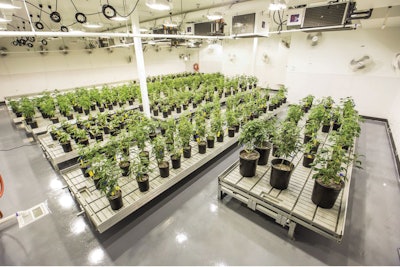
Two Brands, One Face
Vilchis plans on carrying over some of her products from the Nevada market, especially her Queen of the Desert edible line; however, in California, the line will be branded under her California moniker, Hollyweed Queen. Vilchis decided to use different branding in both states in which she operates to capitalize on the momentum and media recognition she has gained in each state.
By focusing on the local brands, Vilchis is betting that she will be able to reach more customers and patients in each market. She predicts what will keep those customers and patients locked into the brand is the quality and variety of products each banner will offer, and loyal customers are more likely to know about the company’s other brands and go out of their way to stay loyal when out of state.
“If anything, people are curious to try both. It gives them an opportunity,” Vilchis says. That said, top-selling and unique products will be carried in both California and Nevada under one brand name. For example, “We’ve got a very extravagant lubricant coming out, and we’re still working on the branding, but it is going to be able to relate with both markets,” she adds.
Ultimately, Vilchis is the face of her company. In fact, she has become one of the most prominent new figures in the cannabis industry, especially considering the headlines she’s made in the past few months in publications like LA Weekly, Crain’s or Bloomberg, and she is not shying away from the attention.
“It’s very flattering,” she says. “The fact that I’ve been almost branded as the female face of cannabis, and people tend to just refer to me as the ‘Queen of Cannabis,’ … I am humbled.”
As for the dealing with the pressures of being in the limelight, she’s got that covered, too.
“As long as I deliver, as long as I follow through with everything that I say, I have no fear,” she says. “I genuinely feel we are going to be able to put up the best product out there.”















